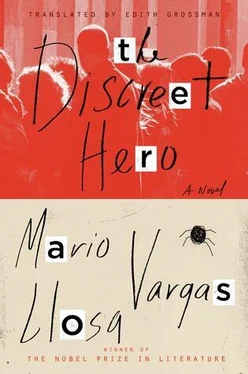Mabel came out to greet them in a flowered robe, sandals, and a towel wrapped like a turban around her head. Like this, without makeup, wan, her eyes still frightened, she seemed less attractive to Lituma than on the day she came to the station to make her statement. But he liked her turned-up nose and the way her nostrils quivered, her slim ankles, the curve of her instep. Her skin was lighter on her legs than on her hands and arms.
“I’m sorry I can’t offer you anything,” she said, indicating that they should sit down. And still she tried to make a joke: “As you can imagine, I haven’t been shopping for a few days and there’s not even a Coke in the fridge.”
“We’re very sorry for what happened to you, señora.” A very formal Captain Silva made a slight bow. “Señor Yanaqué was saying they didn’t mistreat you. Is that true?”
Mabel made a strange face, half smile and half pout.
“Well, up to a point. Luckily they didn’t beat me or rape me. But I wouldn’t say they didn’t mistreat me. I’ve never been so terrified in my life, señor. I’d never slept so many nights on the floor with no mattress and no pillow. And blindfolded and with my hands tied up like an Ekeko doll. I think my bones will ache for the rest of my life. Isn’t that mistreatment? All right, I’m alive at least, that’s true.”
Her voice trembled and at moments a profound fear could be seen in the depths of her black eyes, which she made an effort to control.
“Damn motherfuckers,” Lituma thought. He felt sorry and angry about what Mabel had endured. “Shit, they’ll pay for this.”
“You have no idea how much we regret bothering you now when you must want to rest.” Captain Silva apologized, toying with his kepi. “But I hope you understand. We can’t lose any time, señora. Would you mind if we asked you a few questions? It’s essential before the guilty parties get away.”
“Of course, sure, I understand,” Mabel agreed, putting on a good face but unable to completely hide her annoyance. “Ask your questions, señor.”
Lituma was impressed with how affectionate Felícito Yanaqué was with his little woman. Gently he passed his hand along her face, as if she were his pampered lapdog, moved stray locks of hair from her forehead and tucked them under the towel, brushed away the blowflies that came near her. He looked at her tenderly; he couldn’t take his eyes off her. He held one of her hands in both of his.
“Did you ever see their faces?” the captain asked. “Would you recognize them if you saw them again?”
“I don’t think so.” Mabel shook her head but didn’t seem very sure of what she was saying. “I only saw one of them, and that was hardly at all. The one standing beside the tree, the poinciana with the red flowers, when I came home that night. I hardly noticed him. He was standing sideways, and it was dark. Just when he turned to say something to me and I was about to get a look at him, they threw a blanket over my head. I was choking. And I didn’t see anything else until this morning, when—”
She stopped, her face agitated, and Lituma realized she was making a great effort not to burst into tears. She tried to go on talking but made no sound. Felícito implored them with his eyes to have compassion for Mabel.
“Easy, easy does it,” Captain Silva consoled her. “You’re very brave, señora. You’ve had a terrible experience and they haven’t broken you. I’ll just ask you for one last little effort, please. Of course we’d prefer not to talk about this, we’d prefer to help you bury those bad memories. But the thugs who kidnapped you have to be put behind bars, have to be punished for what they did to you. You’re the only one who can help us get to them.”
Mabel agreed, with a mournful smile. Pulling herself together, she continued. Lituma thought her account was coherent and fluent, though at times she was shaken by whiplashes of fear and had to be quiet for a few seconds, trembling, turning pale, her teeth chattering. Was she reliving the moments of the nightmare, the tremendous fear she must have felt day and night for an entire week while she was held by the gang? But then, she resumed her story again, interrupted occasionally by Captain Silva (“What refined manners,” thought Lituma, surprised), who would ask for more details.
The kidnapping had taken place seven days earlier, after a concert by a Marist choir in the Church of San Francisco on Calle Lima, which Mabel attended with her friend Flora Díaz, who owned a clothing store on Calle Junín called Creaciones Florita. They’d been friends for a long time and sometimes went out together to the movies, to have lunch, and to go shopping. Friday afternoons they usually went to the Church of San Francisco, where the independence of Piura had been proclaimed, since it presented music programs, concerts, choirs, dance, and professional groups. That Friday the Marist choir sang religious hymns, many of them in Latin, or that’s what it sounded like. Flora and Mabel were bored and left before the program was over. They said goodbye at the entrance to the Puente Colgante and Mabel walked back to her house since it was so close. She didn’t notice anything unusual during her walk, no pedestrian or car following her, nothing at all. Just stray dogs, swarms of kids getting into trouble, people enjoying the cool air and chatting in chairs and rockers they’d brought out to the doorways of houses, the bars, shops, and restaurants already full of customers and their jukeboxes playing different pieces of music at top volume, which mixed and filled the air with a deafening noise. (“Was there a moon?” asked Captain Silva, and for a moment Mabel was disconcerted: “Was there? I’m sorry, I don’t remember.”)
Her street was deserted, she thought she remembered. She barely noticed the male figure half leaning against the poinciana. She had the key in her hand, and if he’d tried to approach her she’d have become alarmed, called for help, started to run. But she didn’t notice him making the slightest movement. She put the key in the lock and had to force it slightly—“Felícito must have told you it always sticks a little”—when she sensed somebody approaching. She didn’t have time to react. She felt a blanket thrown over her head and several arms grabbing her, all at the same time. (“How many arms?” “Four, six, who knows?”) They lifted her up and covered her mouth to stifle her screams. It seemed to her that everything happened in a second, there was an earthquake and she was in the middle of it. In spite of her tremendous panic she tried to kick and move her arms, until she felt them throwing her into a van, a car, or a truck and immobilizing her, securing her feet, hands, and head. Then she heard the words that still resounded in her ears: “Nice and quiet if you want to keep on living.” She felt them pass something cold across her face, maybe a knife, maybe the butt or barrel of a revolver. The vehicle took off, shaking and bouncing her against the floor. She curled up and was silent, thinking: “I’m going to die.” She didn’t even have the strength to pray. Without complaining or resisting, she let them blindfold her, put a hood over her head, and tie her hands. She didn’t see their faces because they did everything in the dark, probably while they were driving on the highway. There were no electric lights and it was pitch-black outside. Then it must have been cloudy, with no moon. They kept driving for a time that seemed to her like hours, centuries, but might have only been a few minutes. With her face covered, her hands tied, and her fear, she lost all sense of time. From then on she could never tell what day it was, if it was night, if people were watching her or had left her alone in the room. The floor where she lay was very hard. Sometimes she felt insects walking along her legs, maybe those horrible cockroaches she detested more than spiders and rats. Holding her by the arms, they made her get out of the van, grope her way in the darkness, stumbling; they pushed her into a house where a radio was playing Peruvian music, made her go down some stairs. After putting her on the floor on a rush mat, they left. She lay in the dark, trembling. Now she could pray. She pleaded with the Virgin and all the saints she could think of, Santa Rosa de Lima and the Captive Lord of Ayabaca of course, to help her. Not to let her die like this, to end her torture.
Читать дальше

![Гарри Гаррисон - Bill, the Galactic Hero [= The Starsloggers]](/books/87536/garri-garrison-bill-the-galactic-hero-the-star-thumb.webp)










